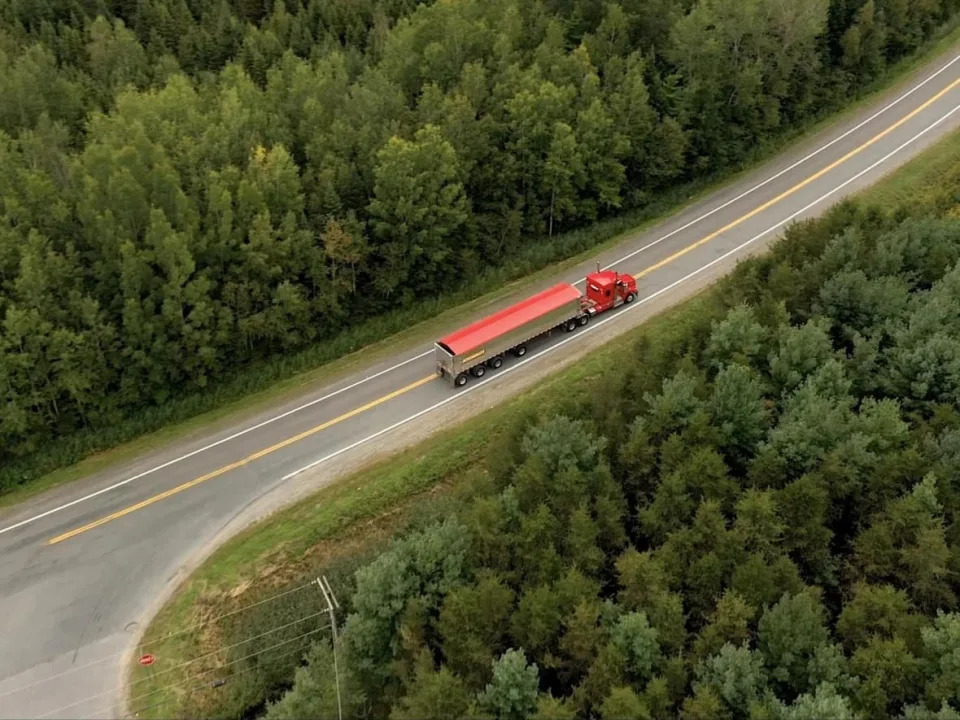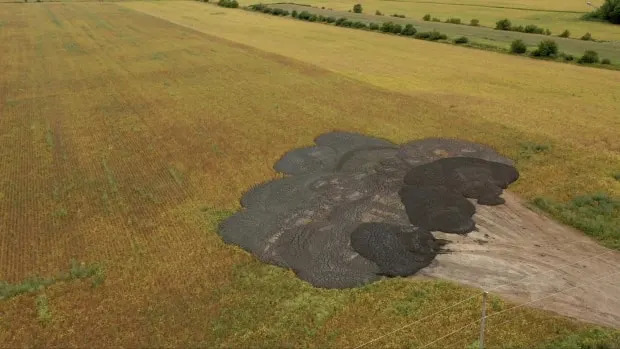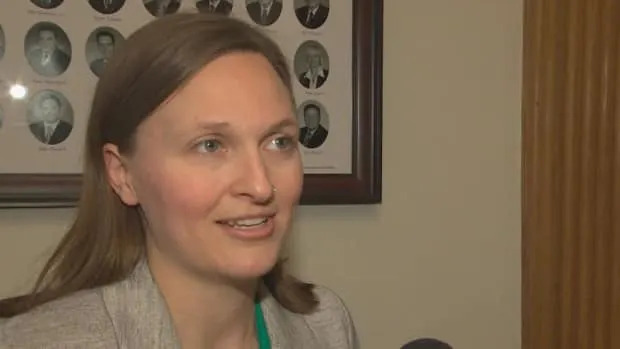Wed, March 8, 2023

Casella Waste Systems was shipping sludge to Québec for agricultural use but after Radio-Canada reported on those shipments last December that province imposed a moratorium. (Francois Genest/Radio Canada - image credit)
A Maine company with a surplus of human waste is increasing its shipments to New Brunswick.
Casella Waste Systems confirmed that it's shipping more sludge from its large landfill north of Bangor across the border and into this province.
"We have recently entered into a new contract with a disposal outlet in New Brunswick," Jeff Weld, the director of communications for Casella, told Radio-Canada in an email.
The New Brunswick government appeared unaware of the increased shipments when contacted for comment.
Environment Department spokesperson Anne Mooers said Fredericton-based Envirem Organics is the only company in the province licensed to import biosolids and has been doing so "for a number of years."
She said the company imported 13,400 tonnes from Maine and Nova Scotia in 2022. "This isn't new," Mooers said in an initial response.

Francois Genest/Radio-Canada
But Casella is moving far more than that amount, according to a company letter.
It's shipping 3,600 tonnes of Maine sludge — about 130 truckloads, according to one Maine media report — to New Brunswick each month.
In a second response, Mooers said Envirem has a "cap" of 100,000 tonnes annually so it "can handle" the additional shipments from Maine.
"The government of New Brunswick takes its role to protect the environment extremely seriously," she said.
"We have had strict regulatory requirements for importing biosolids for many years. New Brunswick legislation requires all importation of waste products to be approved by the province."
'Short term' increase, company says
Envirem CEO Bob Kiely said in a text message that the company has had contracts with Casella for years and "the increase in volume … is expected to be short term."
He said the company has developed more stringent standards for what it accepts "than any other regulatory jurisdiction."
Casella is facing a serious capacity crunch as a result of two new state laws.
A law which took effect Feb. 8 bans the use of the sludge for agricultural production in Maine.
It's a response to concerns the sludge contains so-called "forever chemicals" known as PFAS that are considered a risk to human health.

Francois Genest/Radio-Canada
Another problem is a recent state ban on importing large bulky waste that Casella could mix with the sludge to bury it.
The two bans leave Casella with too much sludge to handle at its landfill site in Old Town, north of Bangor. The site receives sludge from about three dozen local sewer plants.
Casella was shipping sludge to Québec for agricultural use but after Radio-Canada reported on those shipments last December that province imposed a moratorium, based on the same concerns about PFAS.
The U.S. Environmental Protection Agency says exposure to certain levels of PFAS, or perfluoroalkyl and polyfluoroalkyl substances, have been linked by peer-reviewed studies to some cancers, decreased fertility, low birth weights and other effects.
PFAS are chemicals used to make coatings that resist heat, oil and water and can be found in adhesives, packaging and non-stick cooking surfaces among other places. They do not break down and can accumulate.
Weld said in his email that the Québec moratorium "does not have anything to do with" the shipments to New Brunswick.
"All operations are in full compliance with regulations," he said.
Kiely said he expects Casella to find other sources of large bulky waste to mix with the sludge, which will allow it to be buried and reduce the surplus at the landfill, returning export levels to normal.
Concern from N.B. agricultural group
Joel Lamarche, president of the Agricultural Alliance of New Brunswick, said he was concerned about the shipments and would discuss them with the organization's board.
In the meantime, he is warning farmers in the province to not accept any biosolid-based fertilizers that might be from Maine.
"What I would tell them is to refuse it. It's better to refuse it and have no problems than accept it and risk having a major problem," he said.
"If you don't know what's in it, don't use it."
Kiely said Envirem makes compost and its product isn't used on agricultural land. He said he's not aware of any sludge applied to farm crops in the province by Envirem or anyone else.

CBC News file photo
He also said the company is "very selective" about what it receives and recently added even more stringent standards to address "new and emergent concerns."
That includes allowing only "very low" levels of PFAS, he said.
Green Party MLA Megan Mitton says the province needs to act on the Maine shipments.
"They're sending them to New Brunswick because they don't want to deal with the consequences of those products," she said. "I don't want New Brunswick to have to deal with those consequences either."
Sabaa Khan, the David Suzuki Foundation's director-general for Québec and Atlantic Canada, says New Brunswick needs stricter rules on PFAS.
"Under New Brunswick's guidelines, PFAS levels in biosolids are not integrated into the quality criteria. Québec is now looking at that situation and New Brunswick has to take the same action."

Francois Genest/Radio-Canada
New Brunswick's environmental guidelines for the use of industrial byproducts in agricultural soil bans the use of "materials derived from municipal biosolids, which have high levels of pathogens," but does not mention PFAS.
Mooer's response from the environment department Tuesday did not address PFAS either.
In a Feb. 24 letter to a municipal sanitary authority in Maine, obtained by Radio-Canada and CBC News, Casella said the new state legislation had "greatly diminished" the volume of biosolids that its landfill could handle.
That would require 4,000 U.S. tons —the equivalent of 3,600 metric tonnes — to be sent "out of Maine," leading to higher fees to municipal sewage operations, the letter said.
Khan says in Canada, the Canadian Food Inspection Agency regulates the use of biosolids on agricultural land growing food for human consumption, but its criteria do not cover PFAS.
Provinces have the jurisdiction to regulate biosolids through environmental guidelines, she adds.
"It's incumbent on every province to ensure its biosolid regulations are up to date."
No comments:
Post a Comment